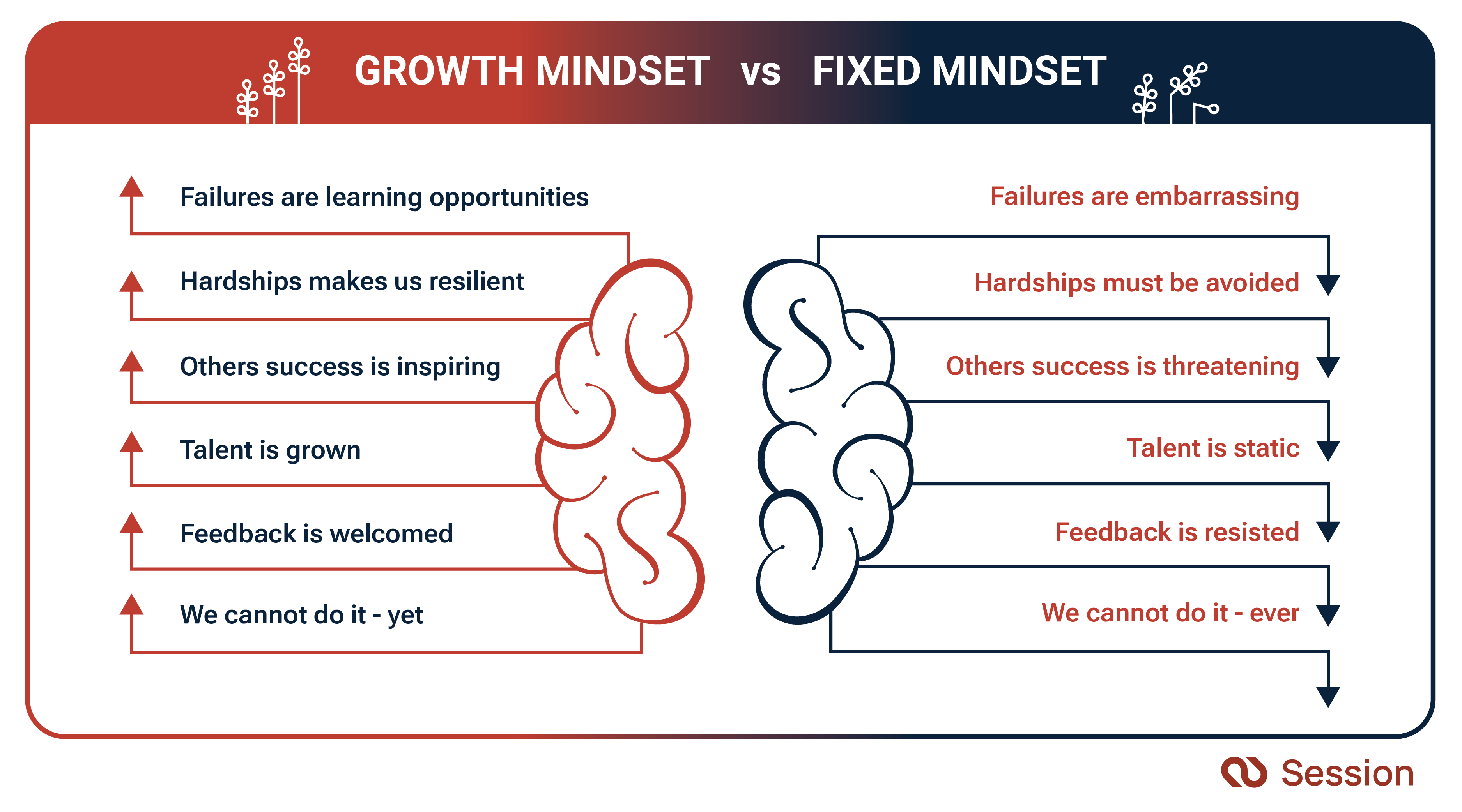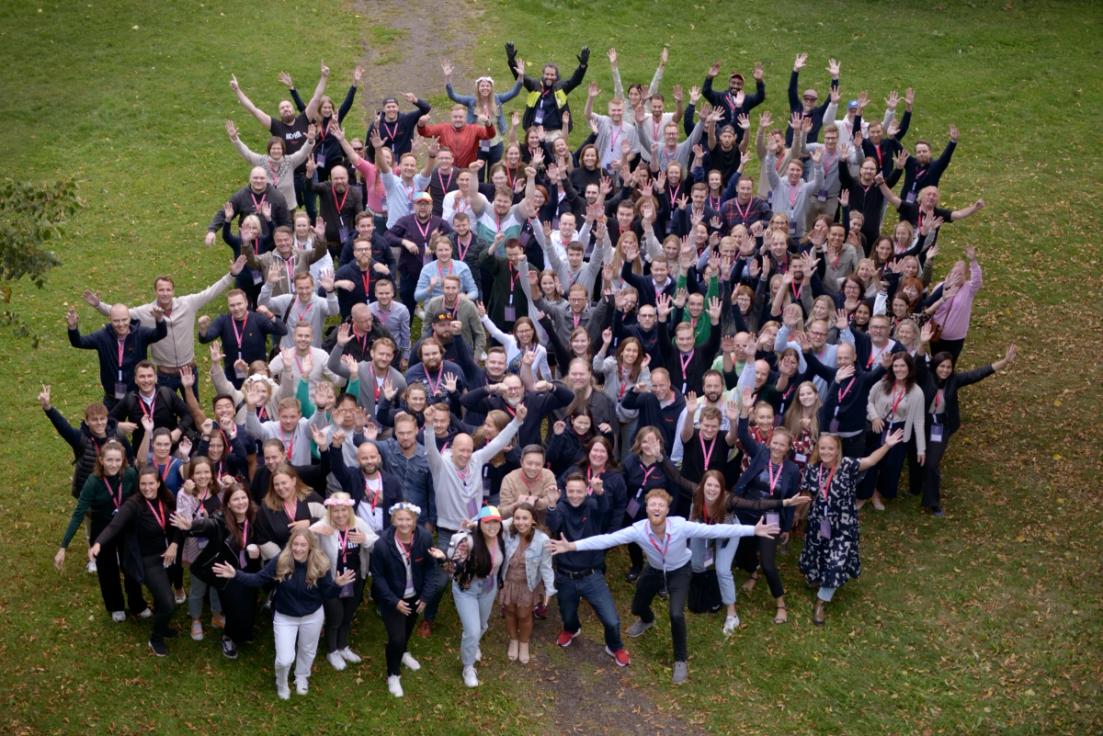A Growth Mindset is the belief that intelligence, abilities, and talents can be developed through dedication, hard work, and learning. The term Growth Mindset was first coined by Professor Carol Dweck, a renowned Stanford psychologist who took up the challenge to study the underlying mindsets driving motivation and thus achievement. Her findings led her to identify two core mindsets: Fixed and Growth.

As you can tell by looking at the illustration above, people with a Growth mindset see challenges as opportunities for growth and are not afraid of making mistakes. Rather, they see them as part of a learning process, giving them an opportunity to learn and grow. In contrast, an employee with a fixed mindset believes that these qualities are innate and unchangeable. People with a fixed mindset tend to avoid challenges, fear failure, and see effort as fruitless if they don't succeed immediately.
Why Nurturing a Growth Mindset is a Good Idea for Organizations
Nurturing a growth mindset is key for organizational growth as well! Amongst some of the crucial factors, we can mention, are:
Adaptability and Resilience
In today's rapidly changing world, businesses need employees who can adapt to new challenges and technologies. A growth mindset amongst employees fosters resilience and the ability to learn from setbacks, enabling employees to thrive even in dynamic environments.
Continuous Learning and Development
A growth mindset equips employees with the ability to constantly seek opportunities to learn and improve their skills. This leads to a more skilled and knowledgeable workforce, better able to tackle complex problems.
Increased Innovation and Creativity
Employees with a growth mindset are more likely to experiment, take risks, and embrace new ideas. This can lead to breakthrough innovations and creative solutions that drive organizational growth.
Improved Performance and Productivity
By focusing on effort and continuous improvement, employees with a growth mindset are more likely to achieve higher levels of performance and productivity. They embrace challenges and persist through obstacles, ultimately leading to better outcomes.
So, all in all, nurturing a Growth Mindset amongst employees is a really good idea, but how does one go about it?
How to Nurture a Growth Mindset amongst Employees
Say, think, repeat: “Not yet” - when trying out and failing
In Carol Dweck’s Tedtalk from 2015, she speaks about “the Power of Yet”. Instead of looking at failures as definite, tell yourself and your team: “We cannot do it - yet - let’s try again”. This fosters an environment where the focus is on trying, learning, pivoting, trying again - rather than thinking everything must be perfect the first time around (which it never is!)
Make learning fun and engaging
Incorporate gamification, interactive activities, and other creative approaches to make learning more accessible, enjoyable and effective. The idea is to create a continuous learning environment, where employees get access to and get to experience learning as a wanted, meaningful and fun activity.
Foster a psychological safe and supportive work environment
Foster a sense of belonging and collaboration at the workplace, where employees feel comfortable sharing their ideas and seeking help from others. Make sure the employees get to know each other also on a more personal level. You can for instance engage them in team building activities, pair them up with a buddy or mentor or invite them to meet with the leadership under more informal settings. These activities and programs are known to build up trust. When employees feel comfortable and safe with their colleagues, mentors and leaders, the likelihood of them speaking up when needed and coming up with ideas is much larger.
Make feedback and continuous learning part of your DNA
In work cultures where feedback is seen as a natural part of the daily work, a growth mindset will eventually develop. When employees are used to asking for, receiving and giving constructive and continuous feedback, an environment of continuous learning, development, and improvement is created. This has a ripple effect into how the employees eventually think of feedback: As something welcomed or rather as something to be avoided!
Celebrate and learn from successes
Make sure to nurture a company culture, where individual, team and company successes are regularly acknowledged, celebrated and highlighted as lessons we can learn from. Just as you can learn a lot by looking at your failures and setbacks - you can also nurture a growth mindset by focusing on learnings from successes.
We hope you found this Guide helpful and wish you luck on the journey towards fostering and nurturing a growth mindset culture at your workplace. Reach out to learn more: getsession.com







